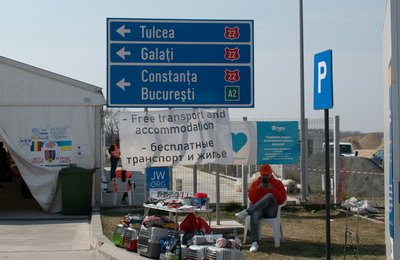Research this month
Exiting Conflict, Owning the Peace: Local Ownership and Peacebuilding Relationships in the cases of Bosnia and Kosovo
There is a need for a more rigorous concept of local ownership which is based on a bottom-up approach and which constructs an effective relationship between local and external actors.
Exiting conflict, owning the peace (pdf), from the London School of Economics and Friedrich Ebert Stiftung, looks at how the concept of local ownership is promoted within international peacebuilding. Using Bosnia and Kosovo as case studies, the paper finds that new ways of thinking are needed to make this idea effective.
Culturally-based Peacebuilding in Pakistan
Pakistani civil society is developing a range of innovative approaches to address extremism and conflict in their country to better foster peace.
Culturally-based Peacebuilding in Pakistan (pdf) is a short policy brief from 3P security looking at how Pakistani civil society is finding ways of promoting peace that draw upon local religious and cultural traditions.
Reconciliation, reform and resilience: Positive peace for Lebanon
Lebanese are not merely passive victims of a violent fate determined beyond their country’s borders: many are hungry for change and have been actively exploring opportunities and pushing boundaries to achieve it.
Reconciliation, reform and resilience is the latest edition of Accord from Concilliation Resources. The collection of articles examines Lebanon since the 1989 Peace Agreement, finding that much work is still to be done to find a sustainable peace.
Humanitarian space in Somalia: a scarce commodity
The history of humanitarian aid in Somalia is not one of political neutrality and impartiality, but rather is the story of how external resources have been used as one of the primary economic and political prizes in a resource-scarce country.
Humanitarian space in Somalia examines the challenges facing humanitarian assistance in Somalia. The paper argues that the political dynamics of international aid in Somalia has led to distrust and insecurity.
Guidance for designing, monitoring and evaluating peacebuilding projects: using theories of change
When we articulate the theories of change underlying our work, we make them available for examination, monitoring and evaluation.
Using theories of change, from CARE International and International Alert, provides practical guidance and advice on how "theories of change" can be used in the monitoring and evaluation of peacebuilding projects.
"For me, but without me, is against me." Why efforts to stabilise the Democratic Republic of Congo are not working
Local civil society organisations should have a substantial influence in adapting stabilisation plans to local dynamics, holding state bodies to account at different levels, and providing services such as local mediation.
For me, but without me, is against me (pdf), from Oxfam, discusses DR Congo's twin stabilisation plans - STAREC and ISSSS. The paper finds fundamental weaknesses with both plans, among them a lack of inclusion for local civil society.
Final Evaluation: "Supporting Trading For Peace in The Great Lakes"
The purpose of the evaluation was to assess the extent to which the respect and trust among and between petty traders and customs officials in the target region had improved and to assess the extent to which knowledge and understanding on issues causing conflict ... have also been improved.
Search for Common Ground have made available the evaluation of their "Trading for Peace in the Great Lakes" project. The project sought to strengthen trade between Burundi, Rwanda and DR Congo, with the aim of building trust between traders in the region.
From the blog
What can the international community do to halt the growing Sudanese conflict?
Sudan protests: a report from on the ground
A report from Khartoum, Sudan, where protests against the government's proposed austerity measures have provoked a violent crackdown from security services. Read more »West Africa: Guns in the wrong hands
Simon Akam travels through Sierra Leone, Liberia, and the Ivory Coast, examining the post-conflict security issues faced by each country, issues which Simon argues are fundamentally a problem of guns in the wrong hands. Read more »State builders: building South Sudan from scratch
One year ago this month the Republic of South Sudan became the world’s newest country. How does one build a nation from scratch? From the official celebration of independence through to the foundations of the fledgling democracy, State builders, a soon to be released documentary, follows Lise Grande, Deputy Head of the UN in South Sudan, and Riek Machar, former guerrilla and newly appointed Vice President, as they attempt to put theory into practice. Read more »Somali civil society discusses Somalia’s future
Ladan Affi, from Djibouti University, reports from the Somalia Civil Society in Istanbul. Billed as a conference “for Somalis and by Somalis,” it provided a rare opportunity for Somali civil society to come together and to talk about issues facing the country. Read more »Uganda: dilemma of accountability for LRA leaders
Civil society and Nepal’s constitution making process
Six years after the end of the conflict in Nepal, political parties have failed to reach a consensus on a new constitution, although there have been huge efforts by Nepalese civil society to put pressure on Nepal’s politicians. Ambika Pokhrel, Insight on Conflict’s local correspondent for Nepal, looks at some examples. Read more »Promoting peace through education in Pakistan
The World Learning Grammar School in from Lyari, a troubled district in Karachi, Pakistan, is part of the peace education efforts of the Peace Education Welfare Organization. Insight on Conflict’s local correspondent in Pakistan, Zahid, reports on how PEWO is promoting peace through schools in Pakistan. Read more »Putting sexualized violence on the map in Syria
The New York-based Women’s Media Center’s Women Under Siege Project has been using modern technology, from e-mail to YouTube to Twitter, to carry out ground-breaking research into sexualized violence as it unfolds in Syria. Read more »Pakistan: Peacebuilding in an impossible context?
Zahid Ahmed, Insight on Conflict’s Local Correspondent for Pakistan, explains how, caught between the restrictions placed on them by the state and a relationship with the general public framed by suspicion of collaboration with the West, Pakistani peacebuilders need to articulate their work on their own terms. Read more »







